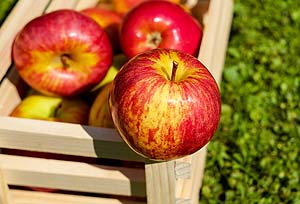Apple Nutrition Facts:
Apple Nutrition Facts and Health Benefits. Apples are wonderful for hydration. An apple consists of approximately 83% water. The typical small apple has only 60 calories; larger fruits can have up to 100 calories per apple. An apple is additionally fat-free and has no sodium. Apples have virtually zero protein, but they do contain tons of carbohydrates.
Approximately 15 percent of an apple consists of carbohydrates from sugar and fiber. An apple can have 13 to fifteen grams of sugar, which can appear to be tons. However, it’s important to remember that this is often natural, unprocessed sugar, which will not cause equivalent blood glucose elevations as refined white sugar can.
Fiber is probably the most important nutrient that apples provide. On a small apple alone, there are usually 3 to 5 grams of fiber.
The fiber is found in the fruit’s skin. So, peeling an apple will remove most of this vital nutrient. Remember, fiber fills you up. This, plus an apple’s high water content, makes it a filling snack and great for anyone on a diet. An apple’s skin also has many quercetins. Quercetin may be a sort of antioxidant that has been shown to possess brain-boosting benefits by protecting cells from damage.
In addition to fiber, apples contain antioxidants that are related to lowering bad cholesterol levels. Apples also contain flavonoids and phytochemicals, which will help protect organs like the lungs and colon. They’re also an honest source of boron, which is related to improved bone density and a stronger heart.
Apples also protect the gut with their high vitamin B content.
Apple vitamin c:
Vitamin C: Vitamin C helps you create collagen. An important structural component of skin and helps maintain your skin’s waterproof barrier.
An outsized apple contains 10.3 milligrams of vitamin C, or 14 percent of the daily vitamin C requirements for ladies and 11 percent for men. Apples contain a high amount of vitamin C.
This is often a strong natural antioxidant that will help boost your body’s resistance to both infectious agents and damage caused by free radicals.
whenever you eat an apple, you will get a healthy dose of this important vitamin
Apple carbs amount:
Carbohydrates are the sugars, starches, and fibers found in fruits
Apples are mainly composed of carbs and water. They’re rich in simple sugars like fructose, sucrose, and glucose.
A medium apple has 25 grams of carbohydrates, taking into consideration 4.4 grams of fiber and roughly 19 grams of natural sugar.
Apple nutrition facts and health benefits:
The apple, an organic product delighted by people for centuries, is something other than a scrumptious bite. It’s loaded with fundamental supplements and flaunts a range of noteworthy medical advantages. Whether you’re a wellness devotee or just hoping to further develop your general prosperity, integrating apples into your eating regimen is a savvy decision.
Nutritional Profile of an Apple
One medium-sized apple (about 182 grams) provides:
- Calories: 95
- Carbs: 25 grams
- Fiber: 4.4 grams
- Vitamin C: 9% of the Daily Value (DV)
- Potassium: 5% of the DV
- Vitamin K: 4% of the DV
- Plus smaller amounts of manganese, copper, phosphorus, vitamin E, and B vitamins.
Health Benefits of Apples
-
Promotes heart health: Apples are low in sodium and fat but high in potassium, which helps regulate blood pressure and reduces the risk of stroke. The soluble fiber in apples, pectin, also helps lower cholesterol levels.
-
Supports gut health: The fiber in apples takes care of the great microbes in your stomach, advancing stomach-related wellbeing and routineness. Gelatin likewise goes about as a prebiotic, which assists these gainful microbes with flourishing.
-
Aids in weight management: Apples are filling and low in calories, making them a great snack choice for weight management. The fiber helps you feel satisfied and prevents overeating.
-
Boosts brain health: Studies suggest that apples may help protect against cognitive decline and Alzheimer’s disease. The antioxidants in apples may also improve memory and focus.
-
Reduces the risk of chronic diseases: The antioxidants in apples, particularly quercetin, may help protect against chronic diseases like cancer, diabetes, and heart disease.
Tips for Enjoying Apples
- Eat apples fresh for the most nutritional benefit.
- Leave the skin on, as it contains most of the fiber and antioxidants.
- Add apples to salads, yogurt, oatmeal, or smoothies.
- Bake apples with cinnamon or other spices for a healthy dessert.
- Make applesauce at home without adding sugar.
Apple Varieties
With over 7,500 apple varieties, there’s one for every taste preference. Some popular varieties include:
- Granny Smith: tart and tangy, perfect for salads and baking.
- Gala: Sweet and crisp, a great all-around apple.
- Fuji: sweet and juicy, with a mild crunch.
- Honeycrisp: Very sweet and crisp, with a honey-like flavor.
- Braeburn: tart and tangy, with firm flesh.

